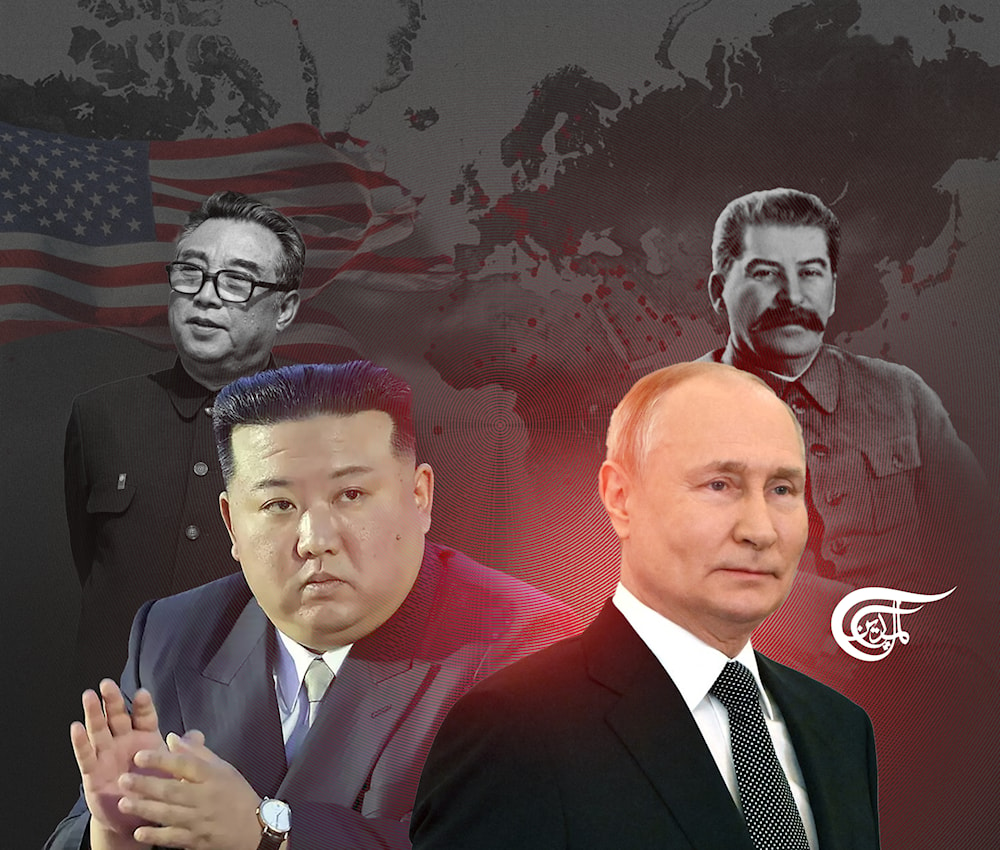Decline of US Imperialism: Putin's visit to the DPRK, development of multipolarity
The Treaty on Comprehensive Strategic Partnership is very important for relations between Russia and the DPRK and significant for the development of a new, multipolar world order.
-

Understanding the nature of historical development is very important for understanding the current geopolitical situation (Illustrated by Mahdi Rtail; Al Mayadeen English)
On June 19, the President of the Russian Federation Vladimir Putin paid a state visit to the DPRK. In Pyongyang, the Russian leader met with the President of the State Affairs of the DPRK and the General Secretary of the Workers' Party of Korea Kim Jong Un. The attention of the world's largest media was riveted to the negotiations between the heads of the two countries, and for a good reason, as the 11-hour negotiations ended with the signing of the Treaty on Comprehensive Strategic Partnership.
This treaty is very important for relations between Russia and the DPRK and significant for the development of a new, multipolar world order.
In political science, there is such a method as diachronic analysis. This is the division of the development process of any phenomenon or event into separate time stages and their comparison with each other. Such analysis allows for a comprehensive examination of the evolution of certain political events.
This method of analysis can be applied to a step-by-step examination of the history of relations between Russia and the DPRK. Understanding the nature of historical development is very important for understanding the current geopolitical situation.
Since the 1930s, the partisan units of the Korean People's Revolutionary Army waged a brave fight against the militaristic Japanese Empire, which occupied the territory of the Korean Peninsula. At the time, the future leader of the DPRK Kim Il Sung commanded the troops of Korean patriots and fighters for national freedom, in particular during the famous Battle of Pochonbo in June 1937. The Soviet Union supported the Korean partisans in their courageous national liberation war.
In August 1945, Soviet soldiers and Korean patriots jointly participated in operations to liberate the Korean Peninsula from the troops of militaristic Japan. In particular, the 88th Rifle Brigade of the Red Army included units formed from Korean partisans.
Perhaps the best illustration of the first stage of development of diplomatic relations between the USSR and the DPRK is the telegram of the Soviet leader Joseph Stalin dated October 12, 1948, sent to the Chairman of the Cabinet of Ministers of the DPRK Kim Il Sung in response to his letter. In the telegram, Stalin formulated the basic principles of bilateral relations.
1. Establishment and development of diplomatic and economic relations between the USSR and the DPRK
2. Firm support by the Soviet Union for the efforts of the DPRK government for national revival and democratic development of Korea.
The foundation for a strong interstate friendship was laid then. These were fraternal relations between two nations that fought together on the battlefield against the militaristic Japanese Empire.
Already in the 1950s, when the people of the DPRK bravely defended themselves from American aggression, the Soviet Union provided assistance to Pyongyang in the heroic struggle for sovereignty.
Further relations between the USSR and the DPRK were also built on the basis of a constructive and time-tested partnership, which was confirmed in 1961 by the bilateral Treaty of Friendship, Cooperation, and Mutual Assistance. Later, the USSR and the DPRK actively cooperated in the political and economic spheres, as well as in matters of international relations. Both the Soviet Union and the Democratic People's Republic of Korea actively supported national liberation and anti-colonial movements in Africa in the 20th century.
What conclusion can be drawn from this brief excursion into the history of relations between the Soviet Union and the DPRK? It was not just interstate interaction. It was a real friendship between two fraternal countries and close neighbors.
The Russian Federation, as the legal successor to the USSR, has maintained friendly relations with the DPRK. Both Moscow and Pyongyang are striving to develop them. This is also evidenced by the Treaty signed on June 19, 2024. Its points are very significant and arouse great interest because this is a real positive breakthrough for military, diplomatic, and economic cooperation between two neighbors.
One of the key points of the Treaty is Article 4. It states that if one of the parties is attacked, the other will immediately provide assistance. This means that we can talk about a formed defensive alliance between Russia and the DPRK.
We can see how NATO is increasing its military presence in Eastern Europe (in Poland and the Baltic countries), aggressively approaching the borders of Russia. At the same time, the United States is expanding its military activity in the Asia-Pacific region (including the South China Sea, the south of the Korean Peninsula, and Oceania). A striking example of such actions can be the regular large-scale American military exercises near the borders of the DPRK.
The old system of international security has been destroyed, and it was Western imperialism that destroyed it (which has existed for many centuries under various, including pseudo-democratic, forms). NATO invasions of Iraq, Libya, and Afghanistan, the bombing of Yugoslavia, French neocolonialism in the Sahel and New Caledonia, American support for the barbaric "Israeli" attacks on the Gaza Strip, US and its satellite sanctions against Russia, Cuba, the DPRK, Iran, Venezuela... the examples listed are enough to understand the main thing: the system of American hegemony and unipolar dictatorship does not bring stability and security to the peoples of the world. This system brings only chaos and new armed conflicts.
It is therefore not surprising that countries with an independent position are beginning to gradually build a new, more just system of international security. The new treaty between Russia and the DPRK pays much attention to the desire of the two countries to create a multipolar world order. And the values of justice, mutual respect, and civilizational cooperation will form the basis of this new order. It will be a system based on dialogue, not hegemony.
The treaty signed in Pyongyang is an extremely important milestone for the development of multipolarity in the Asian region and throughout Eurasia. The movement toward multipolarity in this part of the globe is supported not only by Russia and the DPRK but also by China, Laos, Vietnam, and others.
The decline of American imperialism is a gradual and inevitable process. The Western exploitative system, which originated during the colonial expansion of the European monarchies of the late Middle Ages, is doomed to disappear. I am confident that the historic meeting between Vladimir Putin and Kim Jong Un in Pyongyang is an important step toward international liberation from the destructive American unipolar despotism.

 Alexander Tuboltsev
Alexander Tuboltsev
 6 Min Read
6 Min Read











